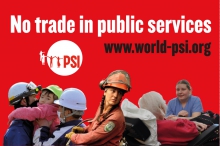New global threat to public services

See PSI's Campaign release kit to download all documents.
New PSI research shows that TISA will create a more favourable environment for privatising public services; permanently block the ability of governments to re-municipalise or establish new public services; restrict the ability of governments to legislate in areas such as workers’ safety, environmental regulations, consumer protection and universal service obligations.
PSI and its affiliates are demanding that those countries currently involved in TISA negotiations:
- release the text,
- exclude all public services from the agreement
- ensure that countries have the right to regulate in the public interest.
We also urge the governments of non-participating countries to clearly state they will not join the agreement.
Alarmingly, the TISA is being negotiated outside the multilateral trade framework by the most pro-liberalisation countries, with the explicit aim of drawing in the rest of the world to the agreement after it has been finalised. This means that the TISA will potentially affect all countries in the world – regardless of whether they are currently participating in negotiations.
The TISA will bind future governments. Combined with the secrecy and lack of consultation, the binding of future governments is a major attack on the democratic rights of citizens to be able to hold their governments to account.
PSI has been monitoring the TISA negotiations and has conducted research to examine the harmful effects of the TISA on Quality Public Services. The results show that the TISA will:
- Create a more favourable environment for privatising public services;
- Permanently block the ability of governments to re-municipalise or establish new public services;
- Extend to areas such as licensing health care facilities, university and school accreditation, municipal water provision, waste disposal facilities, power plants and broadcast licenses;
- Restrict the ability of your government to legislate in areas such as workers’ safety, environmental regulations, consumer protection and universal service obligations;
- Cover all sectors and modes of delivery – including the free flow of migrant labour under the so-called Mode 4;
- Only exclude a narrow tranche of public services;
- Include ratchet and standstill provisions;
- Contain a “negative list” on national treatment (i.e. a requirement that all foreign providers be treated the same as local providers unless the sector is specifically listed for exclusion).
The current negotiating parties are Australia, Canada, Chile, Chinese Taipei (Taiwan), Colombia, Costa Rica, Hong Kong, Iceland, Israel, Japan, Liechtenstein, Mexico, New Zealand, Norway, Pakistan, Panama, Paraguay, Peru, South Korea, Switzerland, Turkey, the United States, and the European Union, representing its 28 member states.
Download our campaign materials: in five languages
For more information on the TISA negotiations and follow-up action see our website: www.world-psi.org/TISA or contact daniel.bertossa@world-psi.org for more information.

